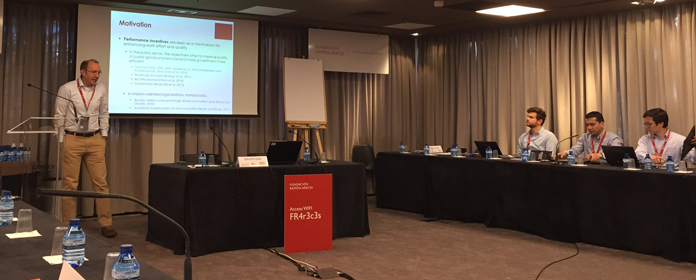Los incentivos de desempeño en las organizaciones de desarrollo y las políticas redistributivas, algunos temas de las sesiones matutinas del VI NCID Research Workshop
También se han abordado otras cuestiones como los efectos de la subida del precio del petróleo en las regiones que lo producen y en áreas vecinas o el impacto de la formación en habilidades interpersonales en el lugar de trabajo

FOTO: Alberto Cendoya
Expertos de instituciones internacionales como el Banco Mundial, la Universidad de Oxford y King’s College London han debatido sobre pobreza y desarrollo en el marco de una reunión científica organizada en Madrid por el Navarra Center for International Development (NCID) del Instituto Cultura y Sociedad de la Universidad de Navarra y la Fundación Ramón Areces.
La primera sesión de la jornada se tituló ‘Beneficios y misión: incentivos de desempeño en una organización de desarrollo de objetivos múltiples’ y corrió a cargo de Xavier Giné, del Grupo de Investigación de Desarrollo del Banco Mundial.
En su intervención, Giné explicó que el impacto de la remuneración por desempeño en las instituciones con objetivos múltiples depende del grado de complementariedad entre las tareas que se realizan para lograr cada una de esas metas.
Presentó un trabajo realizado entre empleados de una institución de desarrollo centrada en el microcrédito, a los que se asignaron de forma aleatoria uno de dos programas de bonificación: crédito y social. El estudio determinó que la bonificación de crédito mejoró los resultados relacionados con el crédito, pero fue negativa para la misión. En cambio, la bonificación social supuso un refuerzo para la misión sin comprometer el programa de microcrédito. El estudio concluyó que un salario fijo es el contrato óptimo si la institución se preocupa tanto por la sostenibilidad como por su misión.
A continuación intervino Sanjay Jain, de la Universidad de Oxford (Reino Unido), con la ponencia ‘Las promesas de redistribución, las transferencias a intereses especiales y la economía política de la reforma con limitada capacidad estatal’.
De acuerdo con el profesor Jain, una cuestión de fondo en la economía política es por qué las políticas económicas dirigidas a mejorar la eficiencia son a menudo difíciles de adoptar desde el punto de vista político. En su intervención expuso un trabajo que examina cómo la presencia de grupos de intereses especiales -por un lado- y la limitada capacidad tributaria por parte del Estado -por el otro- influyen en el tipo de políticas redistributivas para que sean apoyadas por las personas que potencialmente van a salir perdiendo con ellas.
Los votantes reconocen que el gobierno, al compensar a los que salen perjudicados, tiene un incentivo para hacer un mal uso de este mecanismo redistributivo: dirigir la compensación de forma desproporcionada hacia sus partidarios o bien hacia otros grupos de intereses especiales. El análisis sugiere que esto es particularmente perjudicial en países con baja capacidad estatal, donde el apoyo popular para la adopción de reformas que refuercen la eficiencia es probablemente el más bajo.
Expertos de universidades de Suiza y EE. UU.Posteriormente, Roland Hodler, de la Universidad de St. Gallen (Suiza), habló sobre ‘Petróleo y salud infantil en Nigeria’. El estudio que mostró versa sobre el impacto para el desarrollo de los depósitos de petróleo en el nivel local en Nigeria. Para realizarlo se utilizaron datos de encuestas geolocalizadas para crear varios indicadores de desarrollo y pobreza dentro y fuera de las regiones petroleras.
Se halló que el incremento del precio internacional del petróleo tiende a dañar a las comunidades de las regiones productoras en relación con otras áreas, lo que evidencia los perjuicios en el nivel local en Nigeria. Estos efectos negativos no se propagan a las localidades vecinas. Sin embargo, sí hay evidencia de que en estas se experimentan algunas repercusiones positivas de la subida de precio del crudo.
La última sesión de la mañana fue impartida por Achyuta Adhvaryu, de la Universidad de Michigan (EE. UU.). Se centró en ‘Las habilidades para pagar las facturas: retorno a la formación en habilidades interpersonales en el lugar de trabajo’.
De acuerdo con el investigador, la disposición de las empresas a proporcionar formación general a los trabajadores depende de cómo repercute aquella en incrementar la productividad y la posibilidad de que los trabajadores se queden en la compañía. En el estudio expuesto se analizó en concreto cómo impacta en empleadas de la confección en Bengaluru (India) la formación en habilidades interpersonales en el lugar de trabajo.
Se halló que a pesar de una alta tasa de rotación, más trabajadoras que recibieron formación continuaron en la empresa durante el periodo formativo, si bien la diferencia desapareció cuando este se completó. Además, esas empleadas fueron un 12% más productivas.
Uniendo las estimaciones y los costes del programa, se calcula que el retorno neto de la formación en habilidades interpersonales para las trabajadoras es grande: alrededor del 250% nueve meses después de completarlo.




